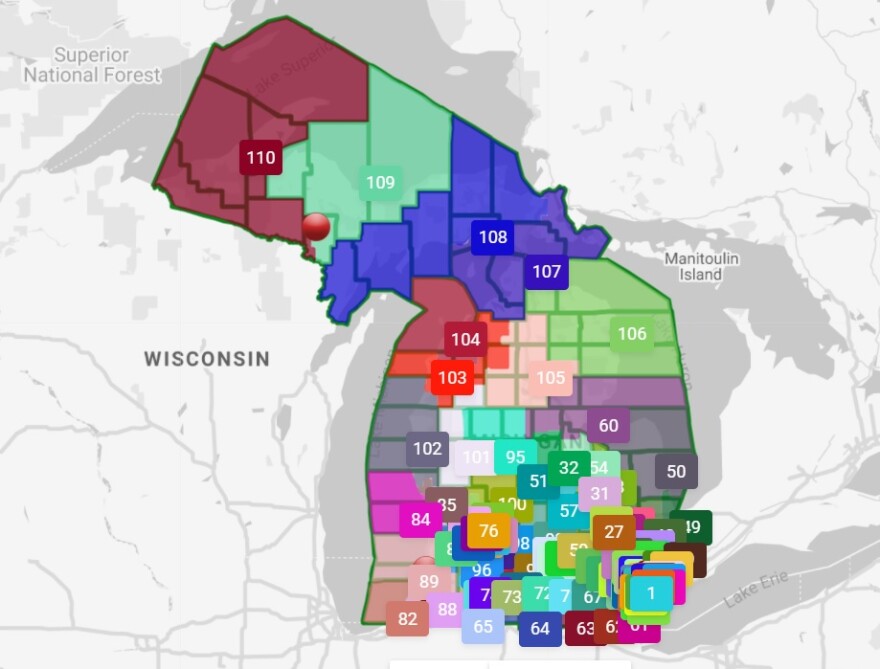The Michigan Independent Citizens Redistricting Commission Monday night released a set of documents under state Supreme Court order.
The Detroit News and other media organizations had sued following the commission’s refusal to release private memos and a recording associated with a closed-door session that took place on October 27.
The memos covered topics like the Voting Rights Act and the impact that historical discrimination in the state has on voting. The commission is in charge of drawing new legislative districts in Michigan, so its work has an outsize impact on who is elected to represent the state’s voters.
In the October meeting, lawyers Bruce Adelson and Julianne Pastula repeatedly told commissioners that most of the information being presented to them about the Voting Rights Act was false. The law does not require so-called “majority-minority” districts, they said. It requires only that communities be able to elect their preferred candidates.
The commission has faced heavy public criticism for proposing maps without majority Black districts—especially in and around Detroit.
“We have become concerned that there is so much misinformation out there, we wanted to have the opportunity to set the record straight,” Adelson said.
To illustrate his point, Adelson brought up claims made in an AFL-CIO fair maps report about the number of required majority-minority districts.
“These documents are infused with either misinformation or a lack of information,” Adelson said.
The attorneys also brought up maps proposed by the group Promote the Vote and calls from the Michigan Department of Civil Rights to redraw its proposed maps.
During the October 27 discussion, the legal team said the Voting Rights Act dealt with the ability of vulnerable communities to elect their candidates of choice, not with the racial makeup of a district. Pastula brought up during discussion about districts centered on Flint, the emphasis was on community representation.
“What I was hearing wasn’t VRA [Voting Rights Act] advocacy. What I was hearing was community of interest advocacy founded on their lived experiences and their history,” Pastula said.
Pastula and Adelson emphasized that the commission’s analysis had shown that was possible without hitting certain racial quotas in districts. They asked commissioners to refrain from using racial terms in their public discussions.
“Please don’t use phrases about adding Black people, subtracting Black people, adding white people, subtracting white people. We’re going in a little bit of a different direction,” Adelson told the commission before adding that “legally, race cannot predominate redistricting.”
Part of the commission’s argument for meeting in private in the first place was that it was specifically hearing legal advice rather than discussing map-drawing.
At times, Pastula slowed debate when she felt the commission was getting too close to discussion that should occur in open meetings.
At one point, Commissioner Brittni Kellom warned against dismissing Detroiters’ community concerns just because analysis said the maps were okay.
“Because I see a bunch of nodding heads, I see us almost taking on the position of what politicians have done and say, ‘Oh, we did a good job and we’re not going to change it.’ And there are certain people there—we all know that ‘candidate of choice’ means electing candidates that look like them. Like, let’s be clear,” Kellom said.
During a press conference Tuesday following the document’s release, commission chair Rebecca Szetela said the full group needs to decide if its proposed maps allow for communities to represent themselves, leaving the door open for considering alternate House maps.
“We had it on our agenda for our last meeting to discuss changing maps, and we could decide to make some changes and start another 45-day period, or we could choose not to,” she said.
The commission is scheduled to vote on final versions of its state House, Senate and Congressional district plans by the end of the year. Considering a map not already in this final pool would require another 45-day public comment period, pushing the commission considerably behind schedule.
CORRECTION: An earlier version of the caption for the map in this story said it showed proposed Congressional districts for Michigan. That is incorrect. The map shows proposed Michigan House districts.



